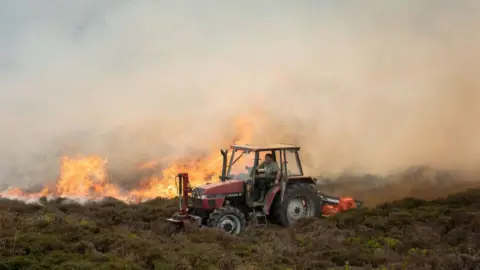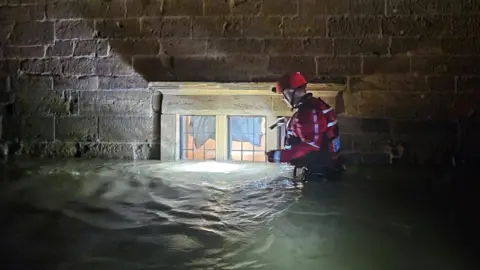UK unprepared for climate change impacts - fire chiefs council
 Getty Images
Getty ImagesThe UK is not prepared to tackle the impacts of climate change, the National Fire Chiefs Council (NFCC) has warned, as it called on the government to take "urgent action" to ensure the country is protected.
It said fire and rescue teams "play a crucial role" in responding to increasingly common extreme weather events such as wildfires and flooding, "often over prolonged periods of time", causing a strain on their "business as usual" services.
Fire chiefs also warned that limited resources and access to longer-term forecasting data created challenges in how the sector prepared for extreme weather.
The Met Office said 2024 was the fourth warmest on record, and has previously predicted climate change would cause summers to be up to 60% drier and winters to be warmer and wetter.
"It is impossible not to be concerned about the very real and immediate threat climate change poses to our planet and what that will mean for our communities," NFCC chairman Mark Hardingham said.
Global average temperatures for 2024 were around 1.6C above those of the pre-industrial period - the time before humans started burning large amounts of fossil fuels - according to data from the Copernicus climate service.
In the past year, parts of the UK have been hit by bouts of severe weather, most recently Storm Éowyn which brought rare red Met Office weather warnings and widespread disruption in the worst impacted areas. Storm Darragh also brought similar red warnings in December.
The UK's summer was the coolest since 2015, driven by a south-shifted jet stream that brought northerly winds carrying Arctic air, though many areas still saw spells of temperatures up to 34C.
Mr Hardingham said: "Watching the devastation caused by the wildfires in Los Angeles and the number of recent flooding incidents we have seen in the UK, it is impossible not to be concerned about the very real and immediate threat climate change poses to our planet and what that will mean for our communities in the future."
He added that fire crews were "on the frontline" in responding to extreme weather and "repeatedly" went "above and beyond to protect their communities".
The UK recorded temperatures of over 40C (104F) for the first time in 2022 - a heatwave that leading scientists said would have been "almost impossible" without human-induced climate change.
It saw several fire services tackle wildfires on parched parts of land including in South Yorkshire, Norfolk, Surrey, Kent and London. Some services declared major incidents.
Rail services were also cancelled in some areas after tracks overheated or buckled.
The NFCC is seeing the "risks around extreme weather increasing", Mr Hardingham said, adding that without "adequate investment" and government action, its "capacity to keep communities safe and protect infrastructure is at risk".
 Northamptonshire Search and Rescue
Northamptonshire Search and RescueThe NFCC urged the government to review the Civil Contingencies Act 2004, which details how the government prepares and plans for emergencies, and also to ensure there are data analysis mechanisms in place that provide an assessment of the risk and impact of incidents linked to climate change.
The UK has pledged to reduce its greenhouse gas emissions to net zero by 2050, meaning it takes as much of the gases out of the atmosphere as it puts in.
It has made a series of pledges to reach this target, including achieving so-called 'clean' electricity by 2030 through rapidly increasing wind and solar generation, and investing in technology to capture and store carbon dioxide.
Prime Minister Sir Keir Starmer announced in November 2024 that the country would aim for an 81% cut in its emissions by 2035.

Sign up for our Future Earth newsletter to get exclusive insight on the latest climate and environment news from the BBC's Climate Editor Justin Rowlatt, delivered to your inbox every week. Outside the UK? Sign up to our international newsletter here.
